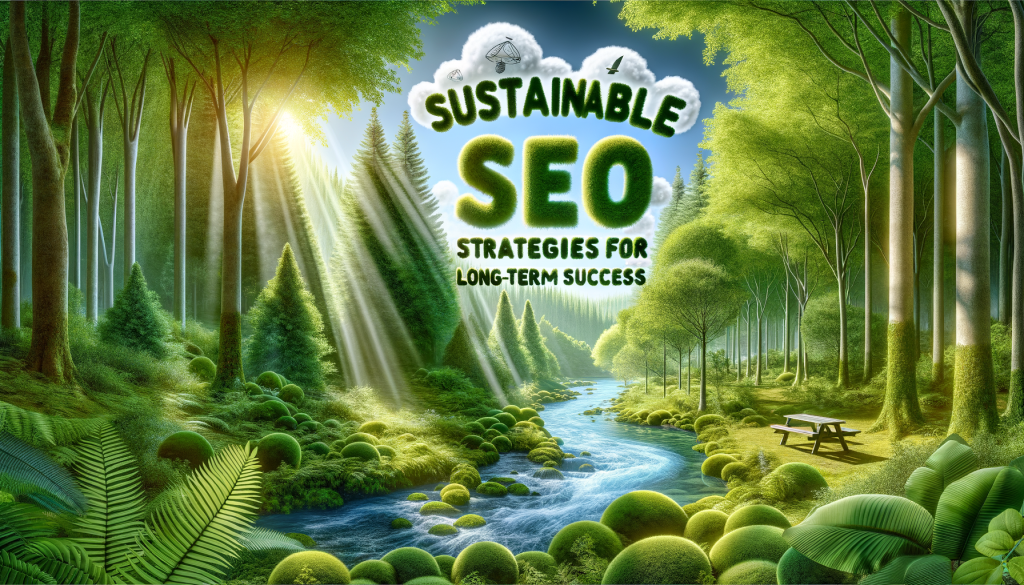Understanding Sustainable SEO
Sustainable SEO refers to the practice of optimizing a website to achieve long-term success in search engine rankings. It involves implementing strategies that not only improve a website’s visibility in search results but also maintain its rankings over time. Sustainable SEO focuses on creating high-quality, relevant content and providing a positive user experience, rather than relying on short-term tactics that may result in penalties from search engines.
There are several key elements that contribute to sustainable SEO:
- Quality Content: Creating well-written, informative content that is valuable to users is essential for sustainable SEO. This includes using relevant keywords naturally within the content and providing in-depth information on the topic.
- Website Optimization: Optimizing the technical aspects of a website, such as its loading speed, mobile-friendliness, and URL structure, is crucial for sustainable SEO. This ensures that search engines can easily crawl and index the site, improving its visibility in search results.
- Link Building: Building high-quality, authoritative backlinks is an important aspect of sustainable SEO. This involves obtaining links from reputable websites that are relevant to the content of the website being optimized.
- User Experience: Providing a positive user experience is vital for sustainable SEO. This includes having a user-friendly website design, easy navigation, and fast-loading pages. A good user experience encourages visitors to stay on the site for longer, reducing bounce rates and improving search engine rankings.
- Social Media Engagement: Engaging with users through social media platforms can help increase brand visibility, drive traffic to the website, and improve search engine rankings. Sharing high-quality content and interacting with followers can also help build trust and credibility.
By implementing sustainable SEO strategies, website owners can achieve long-term success in search engine rankings. It requires a commitment to providing valuable content, optimizing the website for both users and search engines, and engaging with the target audience through various channels.
Building a Strong Foundation
Building a strong foundation is crucial for achieving long-term success in sustainable SEO. It involves implementing strategies that not only improve your website’s visibility in search engine results but also ensure its longevity and relevance.
Here are some key strategies to consider:
- Keyword Research: Conduct thorough keyword research to identify relevant and high-performing keywords for your website. This will help you optimize your content and attract targeted organic traffic.
- Content Optimization: Create high-quality, informative, and engaging content that aligns with your target audience’s search intent. Optimize your content by incorporating relevant keywords, meta tags, and headers.
- On-Page Optimization: Ensure that your website’s technical elements, such as title tags, meta descriptions, and URLs, are optimized to improve search engine visibility and user experience.
- Mobile-Friendly Design: With the majority of internet users accessing websites through mobile devices, it’s essential to have a responsive and mobile-friendly design. This improves user experience and helps your website rank higher in mobile search results.
- Site Speed: Optimize your website’s loading speed to provide a seamless user experience. Slow-loading websites not only frustrate users but also negatively impact search engine rankings.
- Backlink Building: Earn high-quality backlinks from reputable websites to enhance your website’s authority and credibility. Focus on creating valuable content that naturally attracts backlinks from other websites.
- User Experience: Prioritize user experience by designing an intuitive and easy-to-navigate website. Improve site architecture, usability, and accessibility to ensure visitors can find the information they need effortlessly.
By implementing these sustainable SEO strategies, you can build a strong foundation that will support your website’s long-term success in search engine rankings and organic traffic generation.
Creating High-Quality Content
Creating high-quality content is essential for sustainable SEO and long-term success. It not only helps improve your website’s rankings on search engine result pages, but also keeps your audience engaged and coming back for more. Here are some strategies to create high-quality content:
- Research and understand your audience: Before creating content, it’s crucial to know who your target audience is. Conduct thorough research to understand their needs, interests, and pain points. This will help you tailor your content to resonate with them and provide value.
- Focus on originality and uniqueness: To stand out in a crowded online space, it’s important to create original and unique content. Avoid duplicating content from other sources and strive to provide fresh insights, perspectives, and ideas. This not only helps with SEO but also establishes your brand as a thought leader.
- Provide valuable and informative content: Your content should aim to solve problems, answer questions, or educate your audience. The more valuable and informative your content is, the more likely it is to be shared and linked to by others, improving your website’s SEO.
- Optimize your content for search engines: While creating high-quality content, it’s important to optimize it for search engines. Use relevant keywords naturally throughout your content, optimize meta tags, and ensure your content is easily readable and accessible for both humans and search engine crawlers.
- Include visual elements: Visual elements such as images, infographics, and videos can enhance the quality and engagement of your content. They break up the text and make it more visually appealing, increasing the chances of your content being shared and linked to.
- Regularly update and refresh your content: To maintain high-quality content, it’s important to regularly update and refresh it. This not only keeps your content relevant but also signals to search engines that your website is active and up-to-date.
- Promote your content: Creating high-quality content is only half the battle. Promoting it is equally important. Share your content on social media platforms, engage with your audience, and collaborate with influencers or other websites to increase its reach and visibility.
Optimizing for User Experience
Optimizing for user experience is a crucial aspect of sustainable SEO. By prioritizing the needs and preferences of your website visitors, you can create a positive user experience that not only improves your search rankings but also fosters long-term success.
Here are some strategies to optimize for user experience:
- Responsive Design: Ensure your website is mobile-friendly and adapts to different screen sizes. This allows users to easily navigate and interact with your site, regardless of the device they are using.
- Fast Loading Speed: Improve your website’s loading speed by optimizing images, minifying code, and leveraging browser caching. A fast-loading site enhances user satisfaction and reduces bounce rates.
- Intuitive Navigation: Design a clear and logical navigation structure that helps users find the information they need quickly and easily. Use descriptive labels and organize content in a way that makes sense to your target audience.
- Engaging Content: Create high-quality, informative, and engaging content that meets the needs of your target audience. Use a variety of multimedia elements, such as images, videos, and infographics, to enhance the user experience.
- Easy-to-Read Typography: Choose fonts and font sizes that are easy to read on both desktop and mobile devices. Ensure sufficient contrast between text and background colors to improve readability.
- User-Friendly Forms: If your website includes forms, make sure they are user-friendly and require minimal effort from the user. Use clear instructions, validation messages, and consider implementing auto-fill features.
- Accessible Design: Ensure your website is accessible to users with disabilities by following WCAG (Web Content Accessibility Guidelines) standards. This includes providing alternative text for images, using proper heading structure, and making sure your site is compatible with assistive technologies.
By implementing these strategies, you can enhance the user experience on your website, leading to increased user engagement, improved search rankings, and ultimately, long-term success for your SEO efforts.
Earning Natural Backlinks
Earning natural backlinks is an essential strategy for sustainable SEO success. Natural backlinks are links to your website that are earned organically, without any manipulation or artificial tactics. These links are highly valued by search engines because they indicate that your website is trustworthy and authoritative.
There are several ways to earn natural backlinks:
- Create high-quality, valuable content: Producing valuable content that is informative, engaging, and relevant to your target audience is one of the most effective ways to attract natural backlinks. When your content is valuable, other websites and individuals are more likely to link to it as a resource.
- Guest blogging: Writing guest posts for reputable websites in your industry is a great way to earn natural backlinks. By providing high-quality content to another website, you can include a link back to your own website in your author bio or within the content itself.
- Build relationships with influencers: Engaging with influencers in your industry can help you establish relationships and earn natural backlinks. By collaborating with them on content or promoting their work, they may be more likely to link back to your website.
- Participate in online communities: Joining relevant online communities, such as forums or social media groups, allows you to engage with your target audience and establish yourself as an authority. By providing valuable insights and helpful resources, you may attract natural backlinks from community members.
- Create shareable content: Developing content that is highly shareable, such as infographics, videos, or interactive tools, can increase the likelihood of earning natural backlinks. When your content is easily shareable, people are more likely to link to it on their own websites or social media platforms.
Earning natural backlinks takes time and effort, but it is a crucial aspect of sustainable SEO. By focusing on creating valuable content, building relationships, and engaging with your target audience, you can increase the chances of earning natural backlinks that will benefit your website’s long-term success.
Monitoring and Adapting Strategies
Monitoring and adapting strategies is crucial for achieving long-term success in sustainable SEO. By regularly analyzing and evaluating the effectiveness of your SEO efforts, you can make informed decisions and adjustments to optimize your website’s performance in search engine rankings.
Here are some key strategies to consider:
- Track relevant metrics: Monitor important metrics such as organic traffic, keyword rankings, conversion rates, bounce rates, and engagement metrics. These metrics can provide valuable insights into the effectiveness of your SEO strategies and help you identify areas for improvement.
- Perform regular SEO audits: Conducting regular audits of your website’s SEO performance allows you to identify any technical issues, broken links, or other factors that may be negatively impacting your search rankings. Addressing these issues promptly can help maintain and improve your website’s visibility.
- Stay updated with algorithm changes: Search engine algorithms are constantly evolving, and staying up-to-date with these changes is essential for sustainable SEO. Regularly monitor industry news, algorithm updates, and best practices to ensure your strategies align with the latest guidelines.
- Analyze competitor strategies: Keep an eye on your competitors’ SEO strategies to gain insights into their tactics and identify potential opportunities. By analyzing their keywords, content, and backlink profiles, you can refine your own strategies and stay ahead in the competitive landscape.
- Continuously optimize content: Regularly review and update your website’s content to ensure it remains relevant, engaging, and optimized for target keywords. Conduct keyword research to identify new opportunities and optimize existing content for better search visibility.
By monitoring and adapting your SEO strategies, you can adapt to changes in search engine algorithms, address technical issues promptly, and stay ahead of the competition. This iterative approach to sustainable SEO will help you maintain long-term success and drive organic traffic to your website.






I’ve been using sustainable SEO strategies for my business for the past year and the results have been amazing. Not only have I seen an increase in organic traffic, but my website’s rankings have also improved. It’s definitely a long-term investment that pays off in the end.
I’m interested in learning more about the specific sustainable SEO strategies that have been successful for others. Are there any particular tactics that have worked well for small businesses with limited resources?
I’ve had some bad experiences with short-term SEO tactics that ended up hurting my website’s ranking. I’m eager to explore sustainable strategies that will ensure long-term success without risking penalties from search engines.
I’ve found that sustainable SEO not only improves search engine rankings but also enhances the overall user experience on my website. It’s crucial for building a strong online presence and gaining trust from potential customers.
I’m curious about the potential trade-offs of sustainable SEO. Are there any downsides or challenges that businesses might face when implementing these strategies for long-term success?